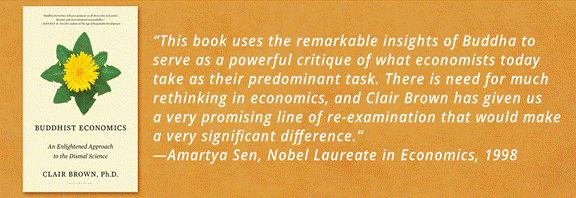|
| 
I recommend the latest book by Richmond author and UC Berkeley Economics Professor Dr. Clair Brown. Buddhist Economics describes a different way of thinking about wealth, using sharing, compassion and happiness rather than revenue generation and accumulation of stuff.
Dr. Clair Brown is Professor of Economics and Director of the Center for Work, Technology, and Society at the University of California, Berkeley. Professor Brown is a past Director of the Institute of Industrial Relations (IRLE) at UCB. Clair has published research on many aspects of how economies function, including high-tech industries, development engineering, the standard of living, wage determination, poverty, and unemployment. Her books include American Standards of Living, 1919-1988, and Chips and Change: How crisis reshapes the semiconductor industry. Clair’s contributions to the field of Labor Economics were recognized by the Labor and Employment Relations Association, who awarded her their Lifetime Achievement Award in 2010. Clair’s economic approach and life as an economist is published in Eminent Economists II – Their Life and Work Philosophies (Cambridge University Press, 2013).
In 2011, Clair began a field, Buddhist Economics, at UC Berkeley. Buddhist economics integrates global sustainability and shared prosperity to provide a holistic model of economic behavior and well-being. Her book Buddhist Economics: An enlightened approach to the dismal science is now available.
In 2013 at UC Berkeley, Clair helped create a new program called Development Engineering, for graduate students in engineering and economics to develop their multidisciplinary skills for designing, building, and evaluating new technologies to help developing regions.
Using the Buddhist economics framework, Clair’s team is developing a measure of economic performance based on the quality of life, and estimating it for state of California. This index integrates measurements of inequality and environmental degradation as well as value of non-market activities and consumption to provide an inclusive measurement of sustainable economic performance to evaluate our economic performance and to guide policy.
For more information about Dr. Brown, read https://buddhisteconomics.net/about/.
|

